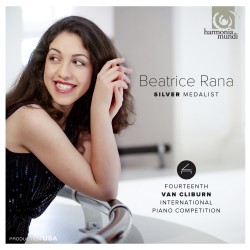Usually the most interesting International Van Cliburn Competition finalists are not first place winners but the runners-up. That certainly is the case with the 2013 Silver Medalist, 20-year-old Italian pianist Beatrice Rana. The live Cliburn Competition performances selected for this disc reveal an extraordinary artistic blossoming since Rana’s promising 2012 Chopin/Scriabin debut on Atma.
Her Schumann Symphonic Etudes (minus the posthumous variations) abound with vitality, dynamism, poetic fantasy, assiduous transitions, and structural revelations. Rana’s subtle inflections of phrase minimize the square-cut effect of Etude 1’s dotted rhythms, while Etude 2 boils over with passionate sweep and ringing inner voices. Etude 3’s right-hand arpeggios are rock-steady yet never routine. Rana uncovers melodies in Etude 4’s canonic chords that few other pianists notice, and keeps the motoric patterns of Etudes 5 and 7 alive with imaginative accents and voicings. Notice, too, Etude 6’s uncommonly-highlighted bass line, or how Rana characterizes the Handelian Etude 8 with prodigious tonal variety. Nor does she sacrifice articulation for speed in the treacherous Etude 9, while the finale’s modifications of pulse carry both the music and the listener forward.
Bartók never banged out his own music as many so-called “Bartók specialists” have done, and neither does Beatrice Rana in the Out of Doors Suite. The Barcarolla’s textural strands emerge in three-dimensional planes that suggest several pianos being played simultaneously in different venues. You actually hear the pitches take shape in Musette’s cluster chords, just as The Chase’s elaborate cross-rhythms evoke a giddy tuned percussion ensemble. In Ravel’s Gaspard de la nuit, don’t expect a demonic, breakneck Scarbo à la Pogorelich or Grosvenor, but revel in Rana’s perfectly poised rapid chords and molten climaxes full of pedal effects that would have made Walter Gieseking envious. Then there’s Le Gibet’s solid pulse and sophisticated dynamic scaling, plus a brisk, shimmering, flexible, and poetic Ondine. A remarkable disc from a young pianist with an old soul, destined for greatness. Actually, revise that last sentence: Rana already is great!
































